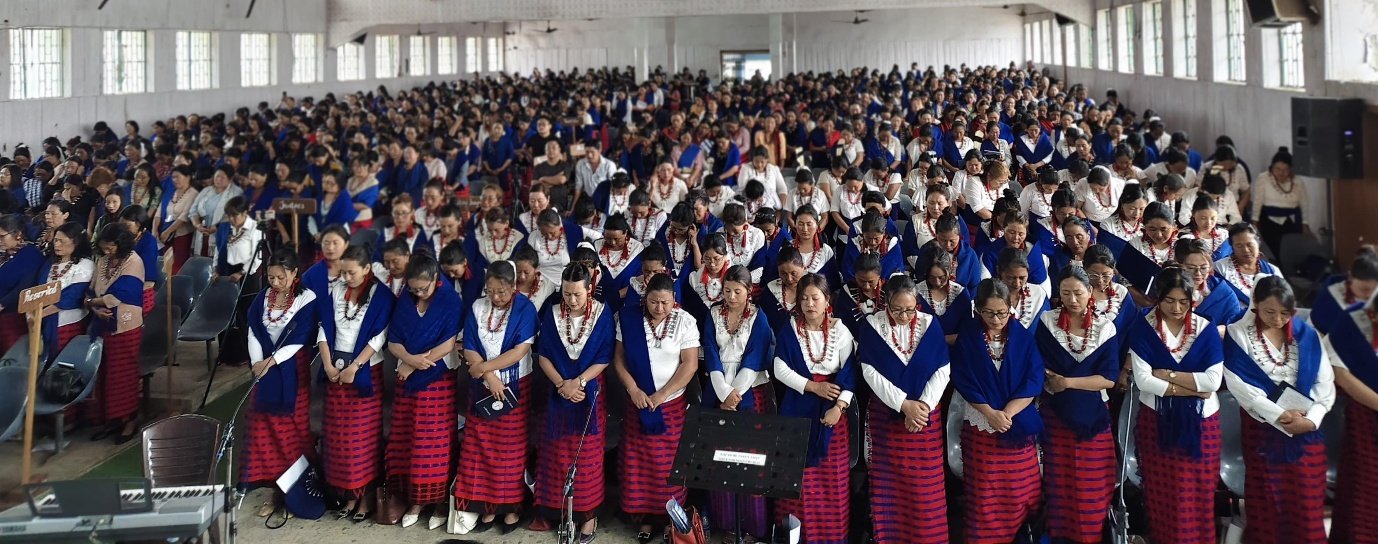The 23rd General Conference of Watsü Mungdang, the apex Ao women’s organization, concluded on April 11 at the Town Hall, Mokokchung, with renewed calls for women to take leadership in reviving Ao culture and literature. The triennial event, held under the theme “Yakpangsür” (Forerunner), witnessed the participation of over 1,500 delegates representing 24 town units and six ranges.

Session One – April 10: Literature as a Catalyst for Change
The first session commenced with a powerful keynote address by Dr. Lanurenla, Principal of Sao Chang College, Tuensang, on the topic “Kenozülu nung Yakpangsür” (Forerunners in Literature). Describing literature as a transformative force, she stated, “Literature has the magical power to surprise, to make us ponder, to awaken conscience, and to bring about social change.”
Dr. Lanurenla emphasized that literature offers insights into human experiences, societal dynamics, and the world at large. Quoting that “Literature is the mirror of society,” she argued that it reflects the joys, sorrows, struggles, and triumphs of humanity. Citing figures such as Plato (The Republic), Charles Darwin (The Origin of Species), Mary Shelley (Frankenstein), Sigmund Freud (The Interpretation of Dreams), and Toni Morrison, she demonstrated how literature has influenced entire disciplines and worldviews.

Importantly, she highlighted that the world’s first recorded author was a woman—Enheduanna, daughter of Sargon of Akkad—who lived in Mesopotamia around 2285–2250 BC. “Let this inspire us—not to have small hearts, but to remember that women have always led the way in literature,” she urged.
Celebrating Ao literary stalwart Padmashree Temsüla Ao, she encouraged Ao women to emulate such legacies and step into literary spaces. However, Dr. Lanurenla also shared data from her research for the Sahitya Akademi (2021), which revealed stark gender disparities. “Most publications in the Ao language are authored by men. In genres such as fiction, poetry, drama, biography, and particularly in translated works, female representation is either minimal or nonexistent,” she said.

She also expressed concern over the lack of young writers, stating, “Most Ao authors today are over 40. If the youth do not write, who will carry our stories forward?” She posed a thought-provoking question: “Will the next generation study only world literature and not Ao Naga literature?”
Dr. Lanurenla called for concrete actions:
Organizing literature festivals, writers’ conferences, and literary competitions
Creating platforms for aspiring writers
Promoting Ao literature from publication to postgraduate and Ph.D. level
Addressing the broader socio-cultural landscape, she pointed to the impacts of colonialism, globalization, and western education. “Our values, customs, music, language—even our fashion—are under threat. We must act now, or we risk losing ourselves,” she cautioned.
Her address concluded with a passionate call: “Let us rise as true Yakpangsür—people of faith, conviction, and cultural pride. Let us write our stories, our battles, our memories. Because no matter how intelligent we are, if it is not written, it will be forgotten.”
Download Nagaland Tribune app on Google Play


In his exhortation, Ao Students’ Conference President Lanutoshi Aier commended women for their growing achievements across various sectors, crediting it to their strong work ethic and deep-rooted sense of dignity of labour. He noted that in many villages, women are often self-employed while unemployment is rising among men, with increasing school dropouts becoming a concern. Aier emphasized that work ethics and values must be instilled from childhood, not after adulthood. He encouraged mothers to guide young boys and girls to embrace dignity of labour and called for increased women’s involvement in policymaking, driven by patriotism, community responsibility, and a desire for societal progress.
Session Two – April 11: General Assembly and Socio-cultural Reflections
The second session on April 11 marked the Watsü Mungdang General Assembly. Mokokchung Deputy Commissioner Thsuvusie Phoji, NCS, delivered an address of gratitude, acknowledging the support, cooperation, and wise counsel extended by Watsü Mungdang during his tenure.

Phoji stressed the importance of collective responsibility: “Besides one’s personal duties, one should also be concerned with the society we live in.” He voiced concern over Mokokchung district’s dependence on other states for agricultural produce and urged women and mothers to restore agriculture as a tradition. “Our district must learn to produce its own food. It is only through our collective efforts that we can achieve food security,” he said.
Marsanen Imsong, President of Ao Senden, delivered an inspiring exhortation, reflecting on the honored role of women in Ao culture. “In our history, women have always been considered medicine—gifted with the power to heal,” he said. Encouraging resilience, he urged women to face life’s challenges with a positive attitude and remain rooted in God and cultural values.
“Let us teach our children to value and speak our mother tongue. Let us preserve our literature, because without it, our culture will fade,” he added.
The keynote speaker of the session, Rev. Dr. Wati Longchar, Executive Director of the Foundation for Theological Education in Asia Pacific (FTEAP), delivered a bold critique of gender inequality in society.

“We live in a society where women are not allowed to participate in policymaking—the reason being a rigid, peculiar, faceless culture,” he stated. He referred to the enduring patriarchal structure and its impact on women’s voices in decision-making arenas.
“There are still bondages of injustice and inequality. Women must have the courage to change this rigidity and liberate themselves from the bondage of inferior consciousness,” he said. He urged women to challenge the mindset of being subordinates and instead lead with boldness and wisdom.
Session Three – Installation of New Office Bearers

The final session brought the conference to a celebratory close with special songs presented by the Sungkumen Unit and Tepenjem Ola, followed by the installation of the new office bearers of the 24th Watsü Mungdang:
President: Tianaro Jamir (Longsa)
Vice President: I. Tangitla (Asangma)
General Secretary: Nokinnaro (Mangmetong)
The three-day conference not only reaffirmed the vital role of Watsü Mungdang in empowering Ao women, but also reignited the call for cultural preservation, literary authorship, and active socio-political engagement.

